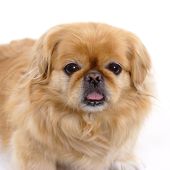|
|
The Pekingese were once call the Lion Dog for his sturdy frame and golden mane.
HISTORY
They are an ancient toy breed that is over 2000 years old. They are believed to have existed as early as 900 A.D. The Pekingese lived with the Imperial family in China and were called "Dogs of Foo". They were named after the capital of China.
PHYSICAL DESCRIPTION
These are small sturdy dogs with a long straight coat, thick mane with plenty of feathering on the tail, underside and legs. Big head with flat wide skull and a black, broad, short and flat nose. His eyes are round, dark, luminous and set wide apart with ears that are heart-shaped. Their have a gait like no other dog. Their bowleggedness makes their walk or trop quite striking. Their double coat has a guard coat that is long ans sweeps to the floor as they walk. Their ears, legs and tail have equally long coats. The undercoat is thick and gives the appearance of having a volume of hair and coat with a mane.
Most of them are red with a black mask and ear tips but their is all sort of color combinations. Black and tan is a popular color.
Weight: 7-14 pounds
Height: 6-9"
Life Span: 14 years
GROOMING
They need brushing daily and groomed professionally every three months. Average shedder.

CHARACTERISTICS AND TEMPERAMENT
- Good-natured
- Sensitive
- Very loving
- Sweet to master
- Wary of strangers
- Loyal
- Dignified
- Self-important
- Confident
- Can be willful
- Pleasant
- Not high strung
- Happy
Pekingese should be socialized because they can be stubborn, jealous and aggressive with other dogs and pets. With socializing they can become good friends. Pekes also need to be convinced that training is as beneficial to them as well as you. They will do anything for you though because they love you.
The little guy is feisty, bold and a courageous guard dog. He is naturally well-behaved and need people although generally he is a one person dog after he decided who he likes best. Not recommended for home with small children but an excellent companion for the elderly. They don't require a lot of exercise.
Pekes can be possessive of their toys and food.
Don't overprotect them because they can develop neuroses. They prefer cool climates. Never keep them outside because they can develop breathing problems because of their flattened face and nose. It's hard for them to regulate their body temperature in overly hot or cold weather.
DIET
Don't overfeed them because they can quickly gain weight.
ALIMENTS THEY ARE PRONE TO:
- Tend to catch cold very easily
- Skin allergies
- Eye problems
- Breathing problems
- Herniated disk
- Dislocated kneecaps
Just4Pooches.com - A Unique Boutique for Your Furry Friend This store has everything even pet birthday products! It has a brand shop and more.
Leave Pekingese and return home
Leave Pekingese and go to Small Dog Breeds Diet.





